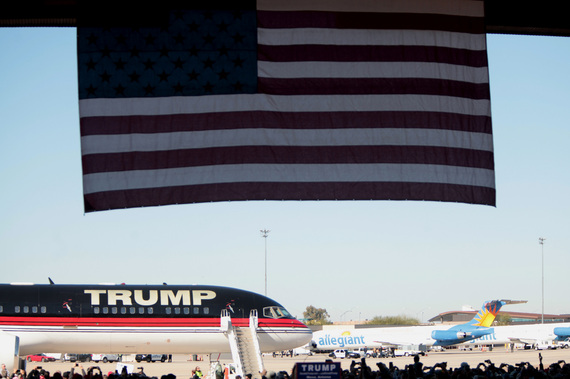When the world realized Donald Trump would be the winner of the US presidential elections on November 8, world leaders and American allies were left wondering where his administration's policies would take them and, more importantly, whether Trump would adhere to the numerous US security commitments that have defined the global order for decades. The first foreign leader (and American partner) to try and get a read on President-elect Trump was Japan's prime minister Shinzo Abe in New York this past Thursday. Although Abe came away from the meeting insisting Trump "can be trusted," he and other Asian leaders are going to have plenty of questions for the new administration come January.
Considering Trump will be the first president without any previous military or government experience, much of his foreign and domestic policy is going to depend on who he chooses for his cabinet. Considering that Trump's inchoate views on Asian affairs sound more like his famous "locker room banter" than actual policy prescriptions, his personnel choices will have a fair bit of latitude to direct how his administration approaches the Asia-Pacific. For Secretary of State, the shortlist of top contenders includes John Bolton, former US Representative to the UN and well-known enforcer of the Bush era's hawkish foreign policy and aggressive worldview, but also Rudy Giuliani, whose official foreign policy credentials don't go far beyond delivering paid speeches and lobbying for foreign governments and political groups.
Regardless of who takes over as Secretary of State, Trump's presidency is already bad news for the "Pivot to Asia". The revolutionary spirit that infused and informed the incoming president's campaign, coupled with his continuous vitriol of how America was being "raped" by China and freeloading allies, is the polar opposite of the Obama administration's delicate attempts at striking a regional balance among competing world powers.
A major reason why Trump has Japanese and South Korean lawmakers so worried are his repeated calls for the US to withdraw the 80,000 troops stationed in East Asia and his questioning of the longstanding US-Japan and US-South Korea security frameworks. According to the Donald, the two Asian powers do not contribute enough to their own defense and rely disproportionally on US capabilities and bases in their countries. True to his Pants on Fire PolitiFact rating, Trump ignores the fact that Japan pays nearly 200 billion yen ($1.95 billion) every year to host US forces and agreed just last April to raise its contributions over the coming five-year period.
Obviously, Trump's bluster set off plenty of alarm bells on both sides of the Pacific. Without the US nuclear umbrella, both Tokyo and Seoul could feel compelled to develop their own nuclear weapons to shield against threats from North Korea, spelling the end of the nuclear non-proliferation regime. Trump's ambiguous stance on the North Korean regime has done nothing to reassure US allies in the region. While calling Kim Jong-un a "maniac," he also very clearly stated that if Kim wanted to come to the US to negotiate, he would welcome him. Trump also expressed thinly veiled admiration for the dictator, saying that he deserved credit for eliminating his political opponents and running the country at such a young age. Kim returned the favor when North Korea backed Trump for president, although the Republican avoided bringing up that particular endorsement during the debates.
Even if Trump has walked back on previous comments regarding the South Korea security commitment, doubts persist. His dismissive attitude toward the Korean nuclear issue doesn't bode well for America's role in Japan-South Korea relations, ties that have improved markedly thanks to a landmark deal between the two countries that covers the Japanese army's use of so-called "comfort women" during the Second World War. The Obama administration helped broker that agreement, and it is very much in America's interest that South Korea-Japan relations be as harmonious as possible in the face of a rising threat from North Korea. For that same reason, North Korea has attempted to discredit it and called the deal a "humiliating agreement." Moreover, Pyongyang wields significant influence over Korean Council for the Women Drafted for Military Sexual Slavery by Japan, a group of surviving victims that is fighting hard to tear up the agreement. In the face of a rising China and North Korean threat, President-elect Trump will want to keep the U.S. - Japan - South Korea alliance strong. By rejecting the Trans-Pacific Partnership (TTP) because it allegedly destroys American jobs, President-elect Trump has not helped strengthen U.S. alliances in Asia in the face of a rising communist threat. Prime Minister Abe's government passed the TTP legislation in Tokyo's Lower House just after Trump's election, braving the headwinds coming from the US.
Kim Jong Un's endorsement of Trump might have been a joke, but there was no question that Trump was the preferred candidate of autocrats the world over. With Trump moving into the White House, Filipino president Rodrigo Duterte suddenly decided to rekindle ties with the US, saying some joint-military exercises would be re-launched because he and Trump share the same tendency to "curse right away, we're the same." In reality, Duterte might be thankful that Trump's rhetoric legitimizes his cavalier treatment of the UNCLOS arbitration ruling in the South China Sea and undermines Obama's emphasis on a rules based order. Yao Yunzhu of the Chinese Academy of Military Sciences put it this way: "For China, territory is the vital national interest, and for the US, the credibility of its defense commitment to allies is key to its regional security architecture."
Now that a Trump presidency will become a reality, America's longtime allies in Asia are facing difficult questions about whether they can truly rely on Washington's commitments. No less than a foundational pillar of the post-Cold War order is up for debate, and it will take much more than one positive meeting with the Japanese premier to undo the months of statements and policy proposals lobbed at Washington's most reliable friends.

